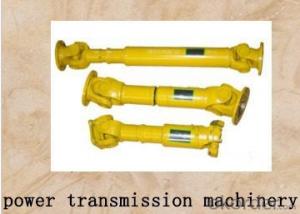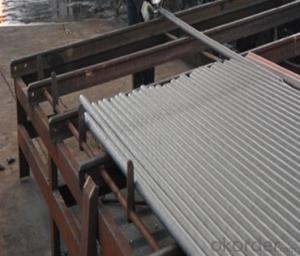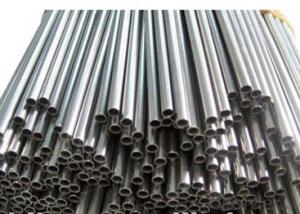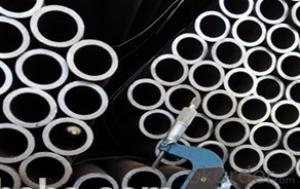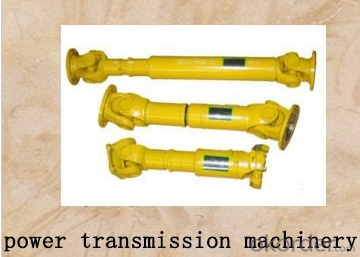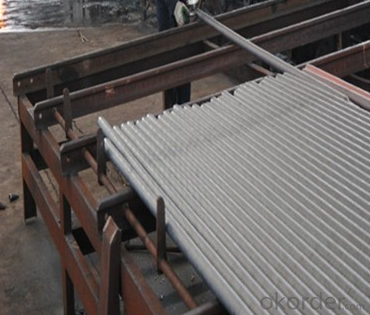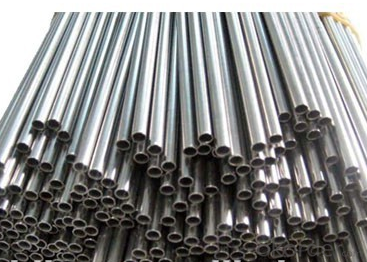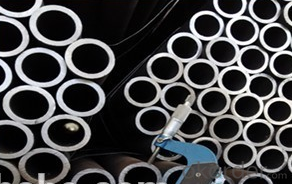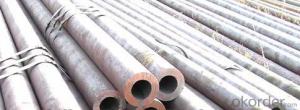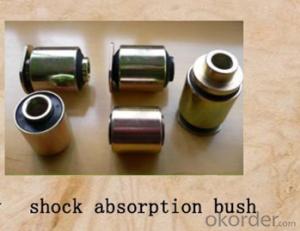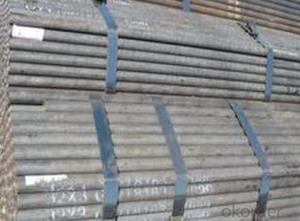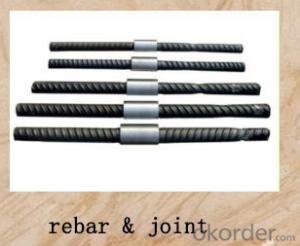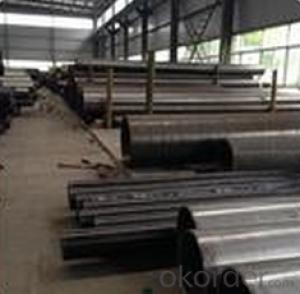1020 Carbon Seamless Steel Pipe 27SiMn CNBM
- Loading Port:
- Qingdao
- Payment Terms:
- TT OR LC
- Min Order Qty:
- 10 pc
- Supply Capability:
- 30 pc/month
OKorder Service Pledge
OKorder Financial Service
You Might Also Like
Quick Details
| Thickness: | 1 - 40 mm | Section Shape: | Round | Outer Diameter: | 21.3 - 609.6 mm |
| Secondary Or Not: | Non-secondary | Application: | Fluid Pipe | ||
| Technique: | Hot Rolled | Certification: | BV | Surface Treatment: | Other |
| Special Pipe: | Thick Wall Pipe | Alloy Or Not: | Non-alloy | Standard: | API 5L,API |
Packaging & Delivery
| Packaging Detail: | Standard seaworthy export packing with steel strip or with plastic clothe, or as requests from the coustomer. |
| Delivery Detail: | 7-25 days after receiveved the deposit |
Specifications
Seamless Steel Pipe
Standard:API ASTM DIN
Size:OD:21.3mm-609.6mm
WT:1mm-40mm
Mechanical properties
standard | grade | Tensile strength(MPA) | yield strength(MPA) |
ASTM A106 | A | ≥330 | ≥205 |
B | ≥415 | ≥240 | |
C | ≥485 | ≥275 |
Chemical ingredients
standard | grade | Chemical ingredients | |||||||||
C | Si | Mn | P | S | Cr | Mo | Cu | Ni | V | ||
ASTM A106 | A | ≤0.25 | ≥0.10 | 0.27~0.93 | ≤0.035 | ≤0.035 | ≤0.40 | ≤0.15 | ≤0.40 | ≤0.40 | ≤0.08 |
B | ≤0.30 | ≥0.10 | 0.29~1.06 | ≤0.035 | ≤0.035 | ≤0.40 | ≤0.15 | ≤0.40 | ≤0.40 | ≤0.08 | |
C | ≤0.35 | ≥0.10 | 0.29~1.06 | ≤0.35 | ≤0.35 | ≤0.40 | ≤0.15 | ≤0.40 | ≤0.40 | ≤0.08 | |
| Company Name | Tianjin Xinlianxin | ||
| Business Type | Manufacturer and Exporter | ||
| Product | steel pipe | ||
| Main Products and Standards | |||
| product name | Specification Range | steel Grade | Executive Standard |
| Structure Pipe | 20mm-820mm 1/2"-32" | 10,20,35,45,16Mn,A53AB | GB/T8162-1999,ASTM A53-98,ASTM500-98,ASTM 500-98,JISG3441-1998,JISG3444-1994 |
| Pipe for Liquid Transportation | 20mm-820mm 1/2"-33" | 10,20,Q345(16Mn),A53AB,A192,SGP | GB/T8163-1999,ASTM A53-98,ASTM A192,JISG3452-1997 |
| Boiler Pipe | 20mm-820mm 1/2"-35" | 20,20G,A179,A106B,A192,ST37.0,ST44.0,ST35.8,ST45.8,Gr320 | GB3087-1999,GB5310-1995,ASTM A106,ASTM A179,ASTM A192,DIN-1629-1984,DIN17175,BS3059.1-1987 |
| 1 | Product | seamless steel pipe | |
| 2 | Standard | U.S.A. | ASTM A53/A106/A178/A179/A192/A210/A213/ A333/A335/A283/A135/A214/A315/A500/A501/A519/A161/A334 API 5L/5CT |
| Japan | JIS G3452/G3454/G3456/G3457/G3458/G3460/3461/3462/3464 | ||
| German | DIN 1626/17175/1629-4/2448/2391/17200 SEW680 | ||
| Britain | BS 1387/1600/1717/1640/3601/3602/3059/1775 | ||
| Russia | GOST 8732/8731/3183 | ||
| China | GB/T8162/T8163 GB5310/6579/9948 | ||
| 3 | Material Grade | U.S.A. | Gr. B/Gr.A/A179/A192/A-1/T11/T12/T22/P1/FP1/T5/4140/4130 |
| Japan | STPG38,STB30,STS38,STB33,STB42,STS49, STBA23,STPA25,STPA23,STBA20 | ||
| German | ST33,ST37,ST35,ST35.8,ST45,ST52,15Mo3, 13CrMo44, 1.0309, 1.0305, 1.0405 | ||
| Britain | Low, Medium, high | ||
| Russia | 10, 20, 35, 45, 20X | ||
| China | 10#, 20#, 16Mn, 20G, 15MoG, 15CrMo, 30CrMo, 42Crmo, 27SiMn, 20CrMo | ||
| 4 | Out Diameter | 21.3mm-609.6mm | |
| 5 | Wall Thickness | 2.31mm-40mm | |
| 6 | Length | As per customers' requirements | |
| 7 | Protection | Plastic caps/ Wooden case | |
| 8 | Surface | Black painting/varnished surface,anti-corrosion oil, galvanized or as per required by customer | |
- Q: Can steel pipes be used for sewer systems?
- Yes, steel pipes can be used for sewer systems. Steel pipes are commonly used for sewer systems due to their durability, strength, and resistance to corrosion. They are able to withstand heavy loads and can be used for both gravity and pressure sewer systems. Additionally, steel pipes provide a long service life, making them a suitable choice for sewer infrastructure.
- Q: How many fasteners are there in a ton of steel tubes?
- The fastener generally refers to the intermediate connecting parts connecting two members, in the construction project for external diameter of steel pipe scaffold with 48mm fixation, the fastener is divided into rectangular fastener (cross directional fastener fastener) rotary fastener (universal movable fastener fastener) (a direct docking fastener fastener fastener) etc..
- Q: How are steel pipes installed underground?
- Steel pipes are installed underground through a process called trenching, where a trench is dug to the desired depth and length. The steel pipes are then placed in the trench and secured using various techniques such as welding or threading. The trench is then backfilled, ensuring proper compaction around the pipes to provide stability and prevent movement.
- Q: How are steel pipes used in the manufacturing of furniture and appliances?
- Steel pipes are commonly used in the manufacturing of furniture and appliances for various purposes. They are used as structural components to provide stability and support, especially in items like chairs, tables, and bed frames. Steel pipes are also used as frames or frames within frames for cabinets, shelves, and storage units, offering durability and strength to hold heavy objects. Additionally, steel pipes can be used as handles or legs for appliances, ensuring stability and easy mobility. Overall, steel pipes play a crucial role in enhancing the strength, stability, and functionality of furniture and appliances in the manufacturing process.
- Q: What is the difference between steel pipe and HDPE pipe?
- Steel pipe and HDPE pipe are two different types of pipes that are used for various applications. The main difference between steel pipe and HDPE pipe lies in their composition and characteristics. Steel pipe, as the name suggests, is made of steel and is a strong and durable pipe material. It is commonly used in industrial applications and infrastructure projects where high strength and reliability are required. Steel pipes are known for their ability to withstand high pressure, temperature, and heavy loads. They are also resistant to corrosion, making them suitable for both above-ground and underground installations. On the other hand, HDPE (high-density polyethylene) pipe is made of a plastic polymer called polyethylene. HDPE pipes are lightweight, flexible, and easy to install, making them ideal for various applications such as water supply, drainage systems, and agricultural irrigation. They are resistant to chemicals, abrasion, and UV rays, making them suitable for both indoor and outdoor use. HDPE pipes are also known for their long service life and low maintenance requirements. In terms of cost, steel pipes are generally more expensive than HDPE pipes due to the raw material cost and manufacturing process involved. However, steel pipes are often chosen for their superior strength and durability, especially in applications where high pressure or extreme conditions are involved. HDPE pipes, on the other hand, offer a cost-effective solution for applications that do not require the same level of strength and durability as steel pipes. In summary, the main differences between steel pipe and HDPE pipe lie in their composition, strength, durability, and cost. Steel pipe is known for its strength and reliability, while HDPE pipe offers flexibility, ease of installation, and resistance to chemicals and UV rays. The choice between the two depends on the specific application and requirements of the project.
- Q: Can steel pipes be used for nuclear power plants?
- Yes, steel pipes can be used for nuclear power plants. Steel pipes are commonly used for various applications in nuclear power plants, such as transporting coolant, steam, and other fluids. They are selected based on their ability to withstand high temperatures, pressures, and corrosive environments. However, specific requirements and regulations related to nuclear safety and radiation protection must be strictly followed during the design, fabrication, and installation of steel pipes in nuclear power plants.
- Q: What are the different pressure ratings for steel pipes?
- Steel pipes have varying pressure ratings to indicate their maximum safe handling pressure. The pressure ratings of steel pipes can differ based on factors like pipe diameter, wall thickness, and material grade. Common pressure ratings for steel pipes are as follows: 1. Schedule 40: This is the standard pressure rating for general applications. It is suitable for low to medium pressure systems, with a maximum working pressure of 150 psi. 2. Schedule 80: Used for higher pressure requirements, it has a thicker wall thickness compared to Schedule 40, enabling it to handle working pressures of up to 300 psi. 3. Schedule 160: This heavy-duty pressure rating is for high-pressure applications. It has an even thicker wall thickness than Schedule 80 and can handle working pressures of up to 500 psi. In addition to these standard pressure ratings, there are specialized steel pipes available with higher pressure ratings, such as Extra Strong (XS) and Double Extra Strong (XXS). These pipes are designed for extremely high-pressure systems and have thicker walls than Schedule 160. It's important to note that the pressure ratings mentioned above specifically apply to steel pipes. Pressure ratings may vary for pipes made from other materials, such as copper or PVC. When selecting a steel pipe, it is crucial to consider the required pressure rating based on the specific application and system requirements to ensure safe and efficient operation.
- Q: Are steel pipes suitable for underground nuclear waste storage?
- Yes, steel pipes are suitable for underground nuclear waste storage. Steel pipes are known for their durability, strength, and resistance to corrosion, making them an ideal choice for safely containing and transporting nuclear waste underground. Additionally, steel pipes can withstand the high pressures and temperatures associated with nuclear waste, ensuring the integrity of the storage system.
- Q: How are steel pipes used in bridge construction?
- Steel pipes are commonly used in bridge construction as structural elements to provide support and stability. They are often used as piers, piles, or columns to bear the weight of the bridge and transfer it to the ground. Steel pipes are also utilized in the construction of bridge decks and railings. Their strength, durability, and versatility make them essential components in bridge engineering.
- Q: How are steel pipes used in the manufacturing of telecommunications infrastructure?
- Steel pipes are commonly used in the manufacturing of telecommunications infrastructure for various purposes such as underground cable protection, overhead cable support, and antenna mounting. They provide durability, strength, and corrosion resistance, ensuring the longevity and reliability of the infrastructure. Additionally, steel pipes allow for easy installation and maintenance of telecommunications equipment, making them an essential component in the industry.
Send your message to us
1020 Carbon Seamless Steel Pipe 27SiMn CNBM
- Loading Port:
- Qingdao
- Payment Terms:
- TT OR LC
- Min Order Qty:
- 10 pc
- Supply Capability:
- 30 pc/month
OKorder Service Pledge
OKorder Financial Service
Similar products
Hot products
Hot Searches
Related keywords
